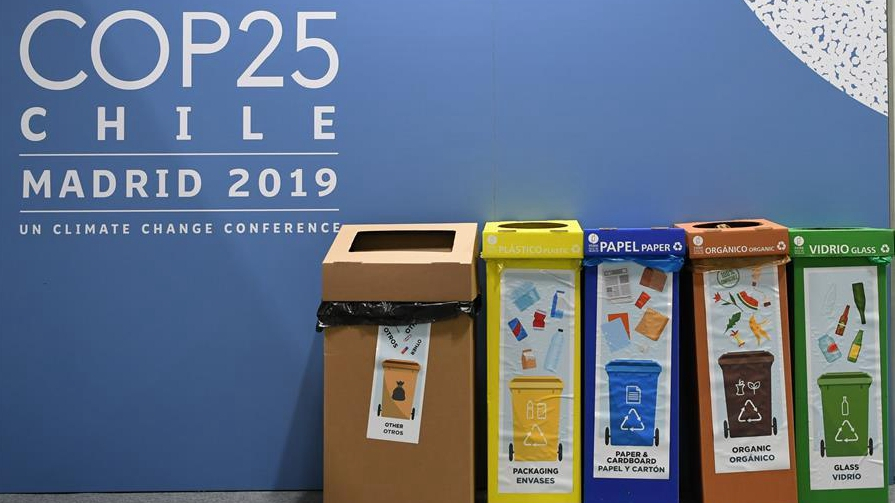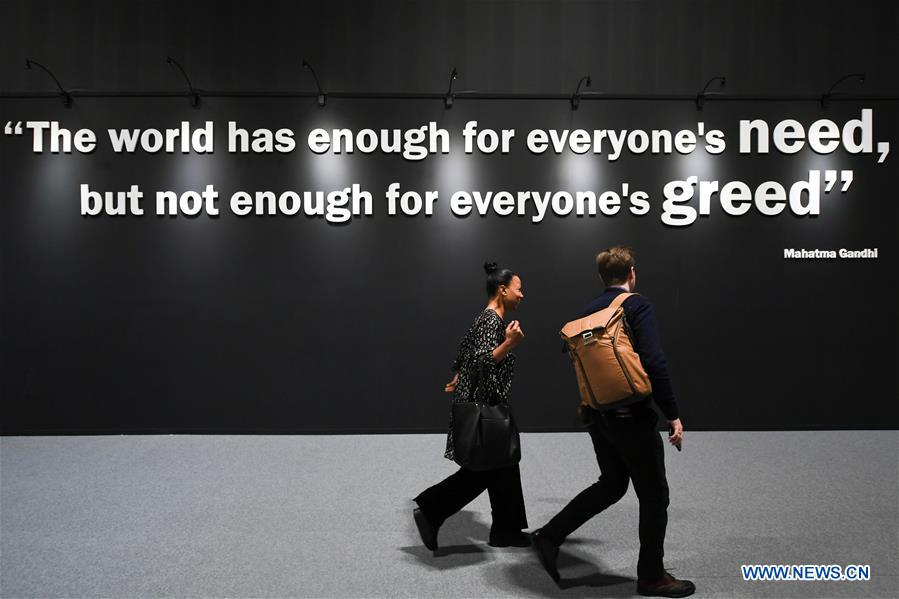
Sorting garbage cans made by paper at the United Nations Climate Change Conference COP25 in Madrid, Spain. Dec. 11, 2019. /Xinhua
Sorting garbage cans made by paper at the United Nations Climate Change Conference COP25 in Madrid, Spain. Dec. 11, 2019. /Xinhua
Editor's note: Alessandro Golombiewski Teixeira is a National Thousand Talent Distinguished Professor of Public Policy at the School of Public Policy and Management, Tsinghua University, and a professor of International Business at Schwarzman College in Tsinghua. He is a former Special Economic Adviser to the President of Brazil and former minister of Tourism, and minister of Development, Industry, and Foreign Trade of Brazil. He was also president of the World Investment Association – WAIPA. The article reflects the author's opinions, and not necessarily the views of CGTN.
With the annual UN climate change conference COP25 concluding on December 13 in Madrid, Mr. Muhammad-Bande, president of the UN General Assembly, offered a simple but poignant metaphor urging for global climate change action. "It is our decision: to go down with this ship or to change course immediately." This was the key call-to-action for countries attending COP25.
Kicking off with the world watching closely, the summit aimed to address difficulties in both implementing the Paris Agreement, and countries failing to reach their targets. These difficulties were reflected in the summit's rocky start. Despite all these, the COP25 agenda was adjusted to try and enforce the commitment of the Paris Agreement signatory countries.
The 2016 Paris Agreement charted a new course for global action in addressing climate change. Yet, the World Meteorological Organization's (WMO) 2019 provisional climate report, released just before the COP25, revealed some concerning statistics.
The last five years were the hottest on record. And in four of the five databases used by WMO, 2019 is already the second hottest on record. Rising temperatures are just one aspect of the climate change crisis that COP25 is attempting to respond to.
The increase in melting sea ice and glaciers is equally alarming. Greenland lost 179 billion tons of ice in July alone, and glacier platforms in the Arctic are melting 70 years ahead of predictions. Antarctica's current rate of melting is three times faster than it was a decade ago, resulting in this year's mean sea level reaching the highest value recorded since measurements began in 1993. Both the loss of sea ice and the increased heat stored in the oceans is contributing to the acceleration of rising sea levels.
The WMO report also addressed socio-political crises arising from extreme weather and acute water shortages. Among these is the displacement of populations affected by extreme weather events. Tropical cyclones and hurricanes such as Idaí (Southern Africa), Fani (South Asia) and Dorian (Caribbean), as well as floods in Iran, the Philippines and Ethiopia, contributed to a total of more than 10 million people being forced to leave their homes between January and June 2019.
Both Cyclone Bulbul (in November, Bangladesh) and Typhoon Lekima (in August, China) led to the evacuation of more than two million people alone. It is hence no surprise that storms and flooding are the primary causes of mass population displacement, and that the number of climate refugees has and will see a significant increase in the future.
Extreme weather broke historical records in many countries in 2019. The U.S., which is in the process of leaving the Paris Agreement, witnessed the "polar vortex" in January that saw temperatures drop to as a low as -48 degrees Celsius, with multiple deaths and cities grinding to a halt.

Visitors walk past the India Pavilion during the United Nations Climate Change Conference COP25 in Madrid, Spain, December 11, 2019. /Xinhua
Visitors walk past the India Pavilion during the United Nations Climate Change Conference COP25 in Madrid, Spain, December 11, 2019. /Xinhua
As the UN Secretary-General Antonio Guterrez said: "For many decades the human species has been at war with the planet, and now the planet is fighting back." How we can move forward and alter humankind's destructive path was the main question debated in Madrid.
As to a solution, a clear conclusion was reached – all countries must contribute to mitigate climate change. Released just before COP25, United Nations Environment Program issued its annual "Emissions Gap Report 2019" warning that unless global greenhouse gas emissions drop 7.6 percent per year for the next decade, the goal of controlling temperature rise to 1.5 degrees Celsius is out of reach.
The G20 collectively accounts for 78 percent of global carbon emissions. Yet, only five member states have committed to long-term zero emissions targets. It seems that most countries are aware of the importance of the environmental efforts but are unwilling to put the measures in place to change the status quo. Several measures that could help achieve climate change goals include:
1. Speeding up cooperation and the establishment of an international carbon market mechanism.
2. Governments can play a more prominent role in enacting policies that encourage a speedy transition to clean energy such as wind, solar, and cutting our carbon footprint by reducing consumption of fossil fuels.
3. Governments need to improve environmental policies that help to reduce consumption of non-recyclable products, and increasing the availability of reusable goods is an alternative way of building a more sustainable future.
4. Look for international experience that can help the world to collectively find new solutions to solve these environment issues.
Each country has a role to play in these measures. China, in particular, has shown to be on track in achieving Paris Agreement targets, according to a recent study by Professor Hu Angang, the Dean of the Institute for Contemporary China Studies at Tsinghua University. In addition, China is also likely to reduce carbon emissions ahead of schedule, without major setbacks to its economic growth.
In tackling climate change, China is an advocate of South-South cooperation, while assisting other developing countries in achieving their climate change related aims. China's work towards achieving these aims is a big piece in the puzzle for global climate efforts. However, the role of developed countries in changing their behavior to respond environmental issues is still central. Only the cumulative efforts of all countries can stop us from going "down with the ship."
(If you want to contribute and have specific expertise, please contact us at opinions@cgtn.com)